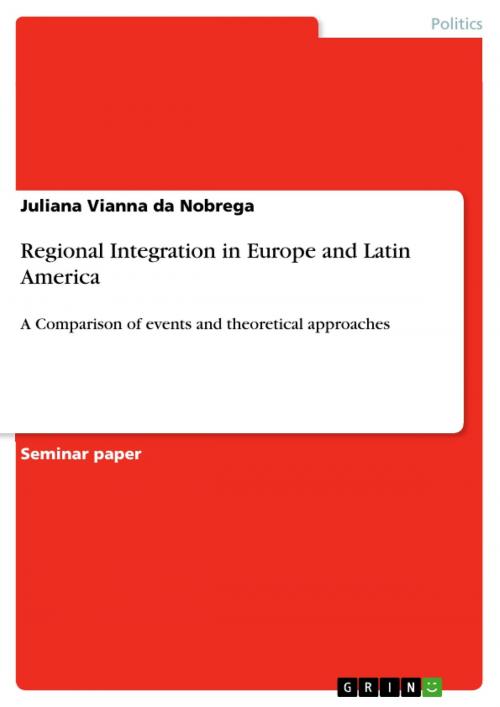Regional Integration in Europe and Latin America
A Comparison of events and theoretical approaches
Nonfiction, Social & Cultural Studies, Political Science| Author: | Juliana Vianna da Nobrega | ISBN: | 9783656341147 |
| Publisher: | GRIN Verlag | Publication: | December 27, 2012 |
| Imprint: | GRIN Verlag | Language: | English |
| Author: | Juliana Vianna da Nobrega |
| ISBN: | 9783656341147 |
| Publisher: | GRIN Verlag |
| Publication: | December 27, 2012 |
| Imprint: | GRIN Verlag |
| Language: | English |
Seminar paper from the year 2012 in the subject Politics - International Politics - Topic: European Union, grade: 2,0, Otto-von-Guericke-University Magdeburg, course: Debates on European Integration, language: English, abstract: The European integration has been in progress since shortly after the Second World War. Already in 1946, the British Prime Minister Winston Churchill held a speech in Zurich and within this speech he expressed the idea of France and Germany as the constituting countries of a European Union. At this time, the patriotic French press was outraged about this idea. But already in 1949 the Council of Europe was founded, and only two years later in 1951 the European Community for Steel and Coal was created and became effective in 1952. In 1957, the member states of the ECSC signed the Treaty of Rome to start the European Economic Community (EEC) (Schmuck, n.a.). The European integration has been a unique process (Rosamond, 2006, S. 450) that lead also to a separate field of studies, the European integration studies. Even though Europe is unique and the integration process that has been taken place there is unique as well, efforts to compare the process in Europe with integration processes in other regions of the world were undertaken. I will tackle the matter with this regard. This paper will be concerned with the integration process in Europe compared to integration processes in Latin America. My motivation to do this arises from the fact that I am a Brazilian student and thus have a Latin American origin and I am studying in Germany, which is in my opinion and most probably not only in my opinion the most important constituting country of the European Union. It is not only the biggest economy in Europe but it is also one of the few constituting states of the predecessor of the EU the already mentioned ECSC and the EEC. A second fact, which is in my opinion intuitive, is the one what the differences of integration processes are and how those can be explained. The first world with Europe and the third world with Latin America might show different difficulties and challenges with respect to efforts on regional integration. [...]
Seminar paper from the year 2012 in the subject Politics - International Politics - Topic: European Union, grade: 2,0, Otto-von-Guericke-University Magdeburg, course: Debates on European Integration, language: English, abstract: The European integration has been in progress since shortly after the Second World War. Already in 1946, the British Prime Minister Winston Churchill held a speech in Zurich and within this speech he expressed the idea of France and Germany as the constituting countries of a European Union. At this time, the patriotic French press was outraged about this idea. But already in 1949 the Council of Europe was founded, and only two years later in 1951 the European Community for Steel and Coal was created and became effective in 1952. In 1957, the member states of the ECSC signed the Treaty of Rome to start the European Economic Community (EEC) (Schmuck, n.a.). The European integration has been a unique process (Rosamond, 2006, S. 450) that lead also to a separate field of studies, the European integration studies. Even though Europe is unique and the integration process that has been taken place there is unique as well, efforts to compare the process in Europe with integration processes in other regions of the world were undertaken. I will tackle the matter with this regard. This paper will be concerned with the integration process in Europe compared to integration processes in Latin America. My motivation to do this arises from the fact that I am a Brazilian student and thus have a Latin American origin and I am studying in Germany, which is in my opinion and most probably not only in my opinion the most important constituting country of the European Union. It is not only the biggest economy in Europe but it is also one of the few constituting states of the predecessor of the EU the already mentioned ECSC and the EEC. A second fact, which is in my opinion intuitive, is the one what the differences of integration processes are and how those can be explained. The first world with Europe and the third world with Latin America might show different difficulties and challenges with respect to efforts on regional integration. [...]















